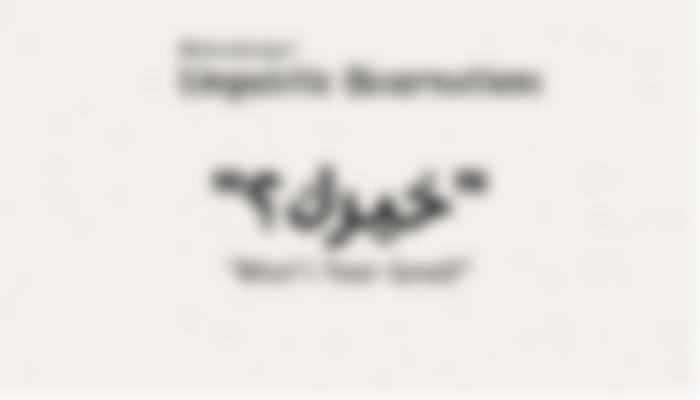Linguistic Observations: The Optimism in Asking "خيرك؟"
In Libya, we often say this one-word question "خيرك؟" and I thought it would be fun to talk about it here...

The most spoken language in Libya is a variation of Arabic. We have more than one Arabic dialect but I'm only familiar enough with the one in the western regions where I live.
For more info about Libyan dialect read my first article of "Linguistic Observations."
It's only when I write in Standard Arabic or English I realize how short and simple Libyan Arabic is. Too many sentences are shortened into one word phrases. One of the examples is "خيرك" (Kheerik) which literally means "Your Good" but depending on the tone and context, it can mean many other things.
We say it when someone looks ill. We say "خيرك؟" in a question form. "What's your Good?" might not make sense in English, but it's a polite way to say "Do you feel anything wrong?"
We say it when someone offends us. "خيرك؟" in a tone that conveys how offended we are. "What's good in what you're doing?" might be a polite way to say "What's wrong with you?!"
We have other variations. Like the third person "خيره" for male and "خيرها" for female. Like "خيرها الحكومة؟" which is our way of saying "What's wrong with the government?"
(Yes, the word government takes feminine pronouns in Arabic.)
We have a lot of optimistic phrases for the good in bad things in the Libyan tongue. One notable example is the name of Coal in Libyan dialect "بياض" which literally means "whiteness" despite Coal being a black piece of Carbon.

This phrase was being used long before I was born, and while the younger generation uses it less, it's still a common phrase in our spoken language.
I think this phrase evolved from the Islamic saying "خيراً إن شاء الله؟" which is about taking any news you receive with an optimistic mindset. It literally means: "By God's will, this is good (news.)" You'll find it a lot of people saying it in various situations in the Islamic historical records.
What do you think?
This article is also on Hive's Ecency.
The written content of this article falls under the License CC-BY-NC. First image was created by Canva. Second image is handwritten digitally.


I'm familiar to the Arbian language but glad to know that you people speak it in Libya. We also use (Khair) for the same meaning.